One way to address the shortcomings of maternal health care is by facilitating the proper utilization of patient data. As in most industries, the actual availability of data isn’t the problem: with the digitization of health records, prescriptions, and test results, HMOs and hospitals, in theory, sit on a wealth of data that encompasses nearly the entire patient journey and has the potential to transform maternal healthcare.
The challenge lies in accessing, processing, and translating this data into meaningful insights that are of actual value for advancing research and the development of pharmaceuticals and treatments.
When it comes to mother-child health in particular, common roadblocks are a usually fragmented and incomplete patient journey that ends at childbirth and therefore doesn’t facilitate in-depth research of the long-term effects of child development. In addition, approaches to pregnancy and mother-child care differ extremely from country to country, making it hard to find data that is actually representative of a larger population that exceeds the national borders.
One way to overcome these hurdles is by looking at countries with a diverse population and advanced pregnancy care. Considering Israel’s pioneering stance in mother-child health, centralized healthcare, the above-average number of annual births, and the diversity of its population, Briya’s data on maternal health is particularly valuable.
Request your customized maternal health dataset here
Diverse Population and Genetic Versatility
Israel is known for its diverse population, comprising various ethnicities and cultural backgrounds. This diversity provides a rich and varied dataset, crucial for understanding maternal health trends and outcomes across different demographic groups. Analyzing such a diverse dataset allows healthcare providers and researchers to create cohorts and identify individual tendencies, immunities, sensitivities, and needs, and accordingly tailor interventions and patient care. Those can then easily be applied to international communities that might be lacking the same data availability and access.
High Birth Rates
Israel boasts one of the highest birth rates among developed countries, with an average fertility rate of 2.93 births per woman as of 2023. This high volume of births generates a substantial amount of data, offering a comprehensive view of maternal and neonatal health. The large sample size enhances the reliability and validity of research findings, making it possible to draw meaningful conclusions and develop robust healthcare strategies.
Centralized Health Records
One of the standout features of Israel’s healthcare system is its centralized health records. The system keeps meticulous track of every individual’s health journey, from prenatal care to childbirth and beyond and therefore allows for the most accurate and complete patient journey possible. Dots between test results, prescriptions, medication, and health condition can easily be connected, making the data complete, accurate, and easily accessible, enabling seamless continuity of care.
Impressive Health Indicators
According to recent data, Israel has achieved remarkable success in several key maternal and child health indicators:
- Low infant mortality rate: 3 deaths per 1,000 live births
- High vaccination rates: 98% of surviving infants received the third dose of DTP-containing vaccine, and 93% of children received the 2nd dose of measles-containing vaccine
- Universal birth registration: 100% of children under age 5 have their births registered
These impressive statistics demonstrate Israel’s commitment to maternal and child health, and provide a solid foundation to advance mother-child health research and patient outcomes.
Turning Data Into A Game-Changer in Maternal Healthcare
The combination of the above mentioned factors turns Briya’s maternal health data into a game-changer in health care. Some of the key benefits include:
- Enhanced Research: The comprehensive dataset allows researchers to significantly advance and deepen their study on maternal health, identify risk factors, and evaluate the effectiveness of interventions on a large scale. This leads to real-world evidence that can accelerate the optimization of patient care and improve maternal and neonatal outcomes.
- Personalized Care: Access to detailed health records enables healthcare providers to tailor care plans to individual needs, considering both medical history and cultural background.
- Policy Development: Policymakers can use the data to inform decisions and create targeted health programs that address the specific needs of different demographic groups. This ensures that resources are allocated efficiently and equitably.
- Predictive Analytics: With a rich dataset, predictive analytics can be employed to forecast trends and potential health issues, allowing for proactive measures to prevent complications and proactively improve maternal outcomes.
- Global Insights: The insights gained from Israel’s maternal health data can be valuable on a global scale. By sharing findings and best practices, Briya can contribute to improving maternal health worldwide.
Briya’s Role In Advancing Maternal Health
Briya’s maternal health data is a goldmine of information that has the potential to revolutionize maternal and neonatal care. The diverse population of Israel, coupled with high birth rates, centralized health records, impressive health indicators, and ongoing challenges provides an unparalleled dataset that can drive research, enhance personalized care, inform policy development, and enable predictive analytics. With such comprehensive and valuable data, Briya is poised to make a significant impact on maternal health outcomes, not just in Israel but globally.
References:
https://pubmed.ncbi.nlm.nih.gov/23287822
https://www.thelancet.com/journals/lancet/article/PIIS0140-6736(17)30929-7/abstract
https://data.worldbank.org/indicator/SH.STA.ANVC.ZS?locations=IL&skipRedirection=true&view=map




